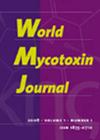埃塞俄比亚女农民农业实践评估:在获得霉菌毒素培训方面存在性别差异
IF 2.2
4区 医学
Q3 FOOD SCIENCE & TECHNOLOGY
引用次数: 0
摘要
埃塞俄比亚是撒哈拉以南非洲地区性别平等表现最低的国家之一,联合国妇女组织在性别差异的程度和范围方面排名121/134。在农业社区,妇女占劳动力的70%,但她们被忽视,无法参加埃塞俄比亚大学(如哈拉马亚大学)举办的培训活动。对来自奥罗米亚和阿姆哈拉地区的349名妇女进行了一项调查,以评估埃塞俄比亚女农民在农业劳动和真菌毒素知识方面存在的性别差异。在奥罗米亚和阿姆哈拉地区,妇女的文盲率都高于男子。妇女在农业活动中发挥了关键作用,但与男性相比,她们获得现代技术的机会有限。妇女主要负责分拣变质的庄稼。特别是在阿姆哈拉,这些都是供家庭消费的,对当地人民的健康构成严重威胁。总体而言,阿姆哈拉妇女比奥罗米亚妇女更了解真菌毒素是什么(如黄曲霉毒素)、它们在作物中产生的影响和风险。与奥罗米亚的妇女相比,阿姆哈拉的妇女也更倾向于在未来对真菌毒素采取行动。只有0.24%的妇女以前参加过真菌毒素培训。广播似乎是向这些地区的埃塞俄比亚女农民提供培训的最有效方式。真菌毒素培训是所有受访妇女的第二选择。这些调查结果清楚地表明,在所审议的两个埃塞俄比亚区域存在着性别不平等。增强妇女对真菌毒素的了解不仅有利于农业收入和国民经济,而且还将使妇女在未来的农业培训计划和干预措施中获得与男性同等的认可。本文章由计算机程序翻译,如有差异,请以英文原文为准。
Assessment of agricultural practices by Ethiopian women farmers: existence of gender disparities in access to mycotoxins training
Abstract Ethiopia is one of the countries with the lowest gender-equality performance in sub-Saharan Africa being ranked 121/134 in terms of the magnitude and scope of gender disparities by the United Nations Women’s Organisation. Within the farming communities, women represent 70% of the labour force, but they are neglected from accessing training events run by Ethiopian Universities (e.g. Haramaya University). A survey to assess the existence of gender disparities among Ethiopian women farmers with respect to agricultural labour and mycotoxins knowledge was conducted on three hundred and forty-nine women from the Oromia and Amhara regions. A higher illiteracy rate was found in women compared to men from both Oromia and Amhara regions. Women played a key role in agricultural activities while having limited access to modern technologies compared to their male counterparts. Women were mainly responsible for sorting spoiled crops. Especially in Amhara, these were intended for home consumption, representing a serious health risk for local people. Overall, women from Amhara were more aware than women from Oromia about what mycotoxins are (e.g. aflatoxins), their impact and risk of occurrence in crops. Women in Amhara were also more intended to act towards mycotoxins in the future compared to women from Oromia. Only 0.24% of women have previously attended a training on mycotoxins. The radio seemed to be the most efficient way to deliver training to Ethiopian women farmers from these regions. Mycotoxins trainings were the second option of choice by all women surveyed. Such findings clearly stated the existence of gender inequality in the two Ethiopian regions considered. Empower women’s knowledge about mycotoxins will not only benefit agricultural income and the national economy, but it will also provide women the recognition they equally deserve alongside their male counterparts in future agricultural training programs and interventions.
求助全文
通过发布文献求助,成功后即可免费获取论文全文。
去求助
来源期刊

World Mycotoxin Journal
MYCOLOGY-
CiteScore
4.60
自引率
5.00%
发文量
25
审稿时长
>12 weeks
期刊介绍:
''World Mycotoxin Journal'' is a peer-reviewed scientific journal with only one specific area of focus: the promotion of the science of mycotoxins. The journal contains original research papers and critical reviews in all areas dealing with mycotoxins, together with opinions, a calendar of forthcoming mycotoxin-related events and book reviews. The journal takes a multidisciplinary approach, and it focuses on a broad spectrum of issues, including toxicology, risk assessment, worldwide occurrence, modelling and prediction of toxin formation, genomics, molecular biology for control of mycotoxigenic fungi, pre-and post-harvest prevention and control, sampling, analytical methodology and quality assurance, food technology, economics and regulatory issues. ''World Mycotoxin Journal'' is intended to serve the needs of researchers and professionals from the scientific community and industry, as well as of policy makers and regulators.
 求助内容:
求助内容: 应助结果提醒方式:
应助结果提醒方式:


